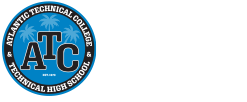Business Management & Administration
Court Reporting Technology,
Court Reporting 2 & 3
Be part of the exciting business industry!
Court reporters record verbatim (word-for-word) testimony and produce transcripts of the testimony. Instruction includes an introduction to verbatim writing skills to work with persons with hearing loss (CART – Communication Access Realtime Translation) and provide captioning for television. The program at ATC utilizes the latest technology in computer-aided transcription and real-time writing; i.e., the ability to have an instantaneous translation of the spoken word by projecting the words onto a television screen for the benefit of persons with hearing loss or onto computer monitors for the benefit of trial participants.
This program is a planned sequence of instruction consisting of three levels. Students completing Court Reporting Technology and Court Reporting 2 possess the entry-level skill-set of a scopist or transcriptionist. To become a Court Reporter, students must complete all three levels of the program. This program places strong emphasis on conflict-free theory, real-time writing, speed development, legal terminology, medical terminology, courtroom procedures, and English skills. When a student reaches the speed of 200 words a minute, he/she participates in an internship that enables the student to sit in on trials and depositions with a working reporter, thus gaining confidence and skill.
A court reporting career, including broadcast captioners, offers an independent lifestyle, prestige, and flexibility, along with a substantial salary.
Students shall pass three (3), five-minute tests with 95% accuracy at each of the following speeds: 225 wpm testimony (two-voices), 200 wpm jury charge, and 180 wpm literary. Students shall complete at least 40 verified hours of actual writing time during the internship experience.
Additional Skills Covered:
-
- Captioning for Television
- Computer Literacy
- Computer-aided Transcription
- Computer-compatible Stenograph Theory
- Courtroom Procedures
- Employability Skills and Portfolio
- General Office Procedures and Skills
- Grammar and Punctuation for Reporters
- Information Processing
- Job Application Techniques
- Legal Terminology
- Medical Terminology
- Oral and Written Communications
- Realtime Technology
- Speed Development
Industry Certification & State Credential Exams:
Students will be prepared to take an approved state and/or nationally recognized industry certification or licensure exam in their field of study. Exam costs are additional; however, you may qualify for reimbursement of your exam cost(s) upon passing. See your program counselor/advisor for more information.
College Credit Transfer Opportunity and/or Advanced Standing:
Upon completion of the program, you may be eligible to receive FREE associate degree transfer credits from Broward College or another state college. To learn more and determine eligibility, visit browardtechnicalcolleges.com/articulation-agreement/, scroll to the career cluster photos, click Business, Management & Administration, or contact your program counselor/advisor. Additional college credit may be awarded with the attainment of industry certifications.

Job Outlook:
For information regarding Court Reporting salaries/wages, visit floridajobs.org.
Enroll in our Court Reporting Technology, and Court Reporting 2 & 3 programs today.
To get started in the Court Reporting Technology, and Court Reporting 2 & 3 program, sign up today for an ATC Program Information Session or to contact counselor at: [email protected] today!
Program Info
Syllabus
Court Reporting Technology
Syllabus
Court Reporting 2
Syllabus
Court Reporting 3
Program Length:
2850 hours (approximately 28 month full-time)
Court Reporting Technology- 750 hours (7 months)
Court Reporting 2 – 600 hours (6 months)
Court Reporting 3 – 1500 hours (15 months)
Program Offered:
August, January & June
Delivery Method:
Traditional – 100% classroom based
Distance – 100% of instructional hours via distance education (online).
Days & Times:
Traditional:
Monday – Friday
8:00 a.m. – 2:30 p.m.
100% Distance
(with mandatory virtual weekly labs):
- Distance
Monday, Tuesday, Wednesday, Thursday, Friday - Virtual Lab
Various options available.
Please coordinate with instructor.
